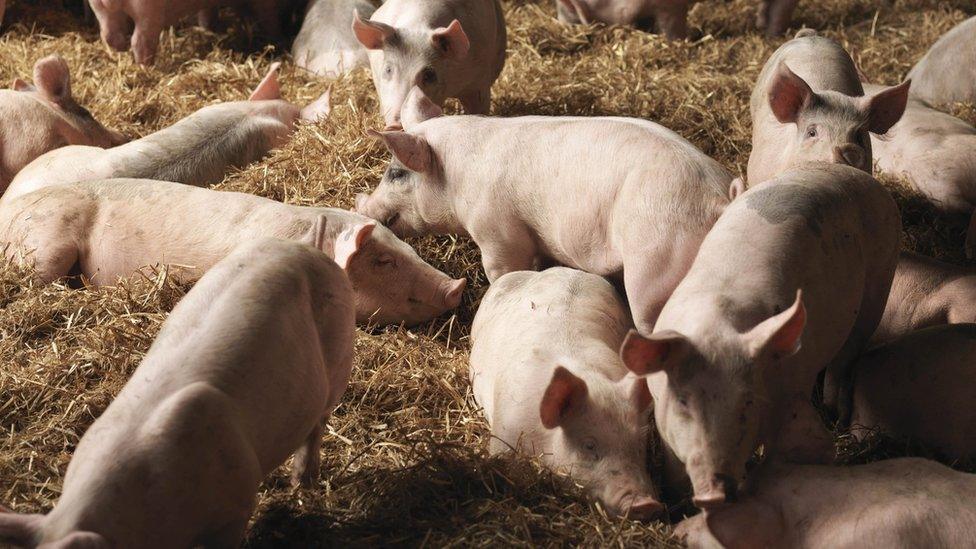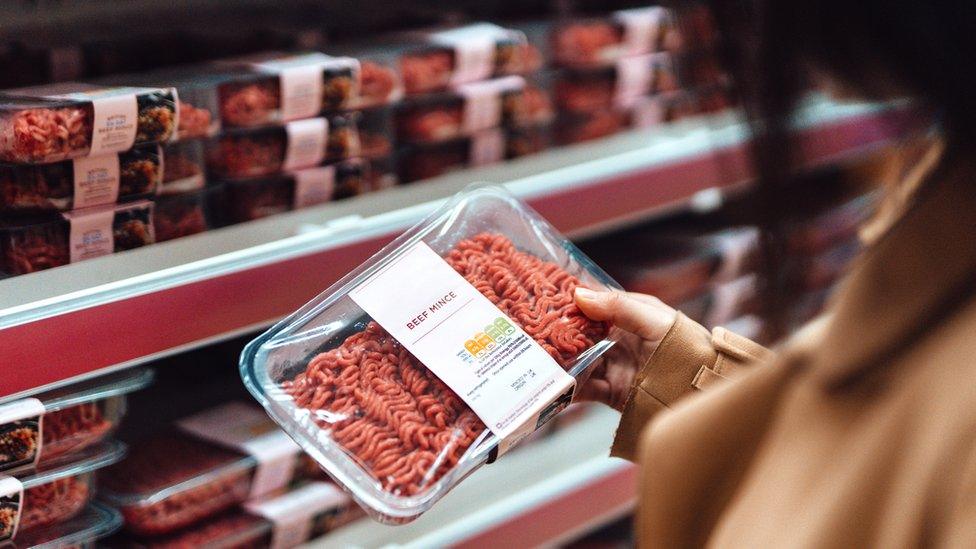Staff shortages see UK meat carcasses sent to EU for butchering
- Published
- comments

Pork producers are set to begin sending pigs to the Netherlands for butchering and packing.
UK meat producers have started sending carcasses to the EU for butchering before re-importing them as they continue to combat a labour shortage.
The British Meat Processors Association (BMPA) say producers are sending beef to the Republic of Ireland amid local shortages of butchers.
Meanwhile, pork producers are set to begin sending pigs to the Netherlands for butchering and packing.
Meat exported in this way cannot be labelled as British pork for UK sale.
According to the BMPA, the move will cost an additional £1,500 for each lorry load of carcasses. This includes transport fees, as well as Brexit customs requirements, such as an export health certificate for each consignment.
Meat exported from the UK currently undergoes checks in the EU, however, the introduction of post-Brexit import controls on food and animals products in the UK has been delayed until July 2022.
"It is what needs to be done to counteract the problem," a spokesperson for BMPA told the BBC.
The move - which was first reported by the Financial Times, external - comes after post-Brexit staff shortages, and a lack of capacity at abattoirs, have led to the culling of more than 10,000 healthy pigs so far.
A shortage of skilled workers, as well as exporting issues, Covid-19, and reduced demand from China, has left the sector with a growing backlog of pork, of which the UK is a significant exporter.
Staffing levels are reported to be at least 15% below the normal level.
The BMPA said: "Immigration rules need to be relaxed so we can get experienced people without having to train them to help solve the immediate short-term problem.
"Then we need to be attracting, recruiting, and training people in the UK. This is not an instant fix, however, as we are looking at 18 months or longer to train these people.
"The government also needs to add key level courses to the support they have already given. As far as we can see there are no food related courses, or they are not the ones we need."
Meanwhile, National Farmers Union vice president Tom Bradshaw said: "Farm businesses have done all they can to recruit staff domestically, but even increasingly competitive wages have had little impact because the labour pool is so limited."
"A short term Covid Recovery Visa, alongside a permanent Seasonal Workers Scheme, would be an effective and, frankly, vital route to help the pressing needs of the industry today. It would also give us time to invest in the skills and recruitment of our domestic workforce."
Temporary visas
Last month, the UK government agreed to issue 800 temporary visas for skilled overseas butchers to work in Britain for six months. However, farmers and meat processors, who are waiting for them to arrive, do not expect them before the end of November.
Nick Allen, chief executive of the BMPA said: "We have been saying we are between 10,000 and 12,000 short of these types of workers, 800 doesn't go very far, it has been made very clear it is only for six months and they go again."

The Department for Environment, Food and Rural Affairs (DEFRA) refused to comment on the number of applications they had received so far.
The government also pledged to fund cold storage for carcasses, while the Agriculture and Horticulture Development Board has launched a cull and render scheme, dedicating a plant to the disposal of animals.
But farmers have criticised the move as not being enough, or not providing a long-term solution, raising concerns about the supply of a number of popular Christmas food products such as pigs in blankets.
"We are in limbo," Zoe Davies, chief executive of the National Pig Association, said. "Some processors are saying they won't come until mid-December, and some are worried some won't come at all as it is just before Christmas."
"Butchers are the most meaningful thing we can have. If we get them on the floor we will start moving more pigs."
She told the BBC: "Sadly this whole situation could have been avoided if the government had acted sooner. While the package of measures announced in October was very welcome, we have yet to see any benefit and even if the measures operate as intended, it will be some time before any meaningful impact is seen on farms.
"For many this will come too late."